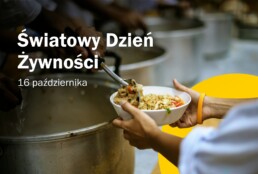On the occasion of the International Food Waste Awareness Day, which is celebrated on 29 September each year, Eurostat presented data for 2022 on the scale of food waste in EU countries. On the occasion of World Food Day, celebrated on 16 October, the data is presented below.
72 kg per capita - that's how much food we wasted at home in 2022.
Food waste is one of the biggest global problems, affecting not only the economic but also the environmental and ethical spheres. Recently published Eurostat figures show that as much as 59.2 million tonnes of food waste will be generated in EU Member States in 2022. As much as 54% of this waste, or 32 million tonnes, was wasted in households. It can therefore be hazarded to say that each person in the EU threw away as much as 72 kg of food. If we translate these figures into an average five-person household, it turns out that in the whole of 2022, its inhabitants wasted as much as 360 kg of food, or almost 1 kg per day. Let's remember that we are only talking about food from household fridges and cupboards!
Reporting obligation as part of a strategy to reduce food waste
The data presented in the Eurostat Communication are taken from EU Member State reports prepared in accordance with the methodology defined in EC Decision 2019/1597 of 3 May 2019. Under the Waste Framework Directive (2008/98/EC), each country is obliged to submit an annual report on measuring food waste. 2022 was the third year in which reports were prepared in accordance with the methodology.
Let us recall that in 2020, i.e. in the first reporting year, a total of almost 57 million tonnes of food waste was generated, or 127 kg per capita. In 2021, this was 58.4 million tonnes and approximately 131 kg per average person in the Member States, respectively. Significantly, all of the quoted data were collected during the Covid-19 pandemic periodwhich has had a significant impact on the activities of the manufacturing and food processing sectors,
As reported by Eurostat:
The impact that the end of the lockdowns associated with the Covid-19 pandemic may have had on both industries is still being investigated.
Where is the most food wasted?
Among those responsible for the generation of food waste, definitely dominated by the households already mentioned. The following places were followed by:
- food and beverage manufacturers - 19%, or more than 11 million tonnes,
- catering industry - 11%, or less than 7 million tonnes,
- primary production sector (agriculture) - 8%, or almost 5 million tonnes,
- retailers and other distributors - 8%, or just under 5 million tonnes.
It should be noted that entrepreneurs generating food waste are increasingly using professional composting machinerywhich enable this waste to be processed into pre-compost.
In addition to data for the EU as a whole, we also have data for 2022 for individual countries, including Poland. Total more than 4.5 million tonnes of food waste were generated in our country, of which:
- over 2.5 million tonnes in households,
- 720,000 tonnes in the primary production sector,
- 550,000 tonnes at processing companies,
- 470,000 tonnes at retail outlets,
- 260k in catering.
The aforementioned 4.5 million tonnes of food waste places us in an infamous 4th place among Community countries. Per capita, this is approximately 119 kg of wasted food. By contrast, we rank 16th in the EU as a whole with this result.
Interzero's range of eco-equipment also includes. small electric composter Oklin designed for households to help reduce food waste by creating compost from kitchen waste.
Check also, how to separate bio-waste.
Obligation to conduct public education campaigns
Pursuant to Polish law, every entrepreneur who places packaged products on the market is obliged to conduct public education campaigns. The purpose of these campaigns is to inform and educate consumers. Furthermore, entrepreneurs are obliged to allocate at least 2% of the total value of packaging placed on the market in the previous year to educational activities. Interzero, as a leader in waste management and recycling, not only fulfils these obligations, but also meets the needs of the market by offering a wide range of educational services. Action Fraction is just one of the many projects that Interzero carries out to build environmental awareness in society.
Sources:
- Eurostat, Food waste and food waste prevention - estimates, https://ec.europa.eu/eurostat/statistics-explained/index.php?title=Food_waste_and_food_waste_prevention_-_estimates#In_the_supply_and_consumption_sectors.2C_food_waste_generation_may_represent_10.25_of_food_supplied_in_the_EU
- Eurostat, Food waste per capita in the EU remained stable in 2021, https://ec.europa.eu/eurostat/web/products-eurostat-news/w/ddn-20230929-2
- Eurostat, Food waste: 127 kg per inhabitant in the EU in 2020, https://ec.europa.eu/eurostat/web/products-eurostat-news/-/ddn-20220925-2
- European Foods Bank Federation, First EU-wide monitoring of food waste: 127 kg per inhabitant in the EU in 2020, https://www.eurofoodbank.org/first-eu-wide-monitoring-of-food-waste/
